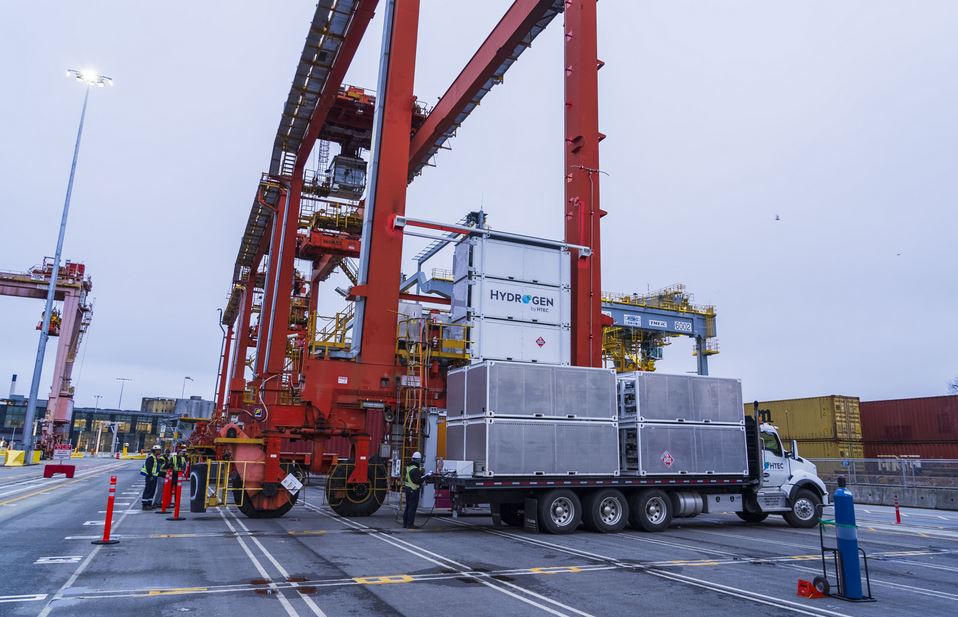 DP World has completed initial testing of a hydrogen fuel cell rubber-tired gantry (RTG) crane at the Port of Vancouver, according to the company's release.
DP World has completed initial testing of a hydrogen fuel cell rubber-tired gantry (RTG) crane at the Port of Vancouver, according to the company's release.
This development marks a step in the company's initiative to decarbonize its port operations. The RTG is currently undergoing field testing to assess the feasibility of electrifying DP World’s global fleet of 1,500 RTG cranes.
At DP World’s Vancouver terminal, 19 RTG cranes account for 50% of diesel consumption, generating over 4,200 tonnes of CO2 annually. The adoption of hydrogen technology is anticipated to significantly reduce or eliminate this impact.
The RTG crane has a storage capacity of up to 135 kg of compressed gaseous hydrogen in 15 pressurized tanks. The hydrogen fuels the fuel cell system, which charges a high-voltage battery that powers the crane’s electric drive. The bidirectional power system recovers energy during container lowering, reducing energy demand and improving operational efficiency.
DP World commenced the pilot project in October 2023. The initial phase involved retrofitting a diesel RTG with a Hydrogen-Electric Generator (HEG), battery energy storage system, hydrogen storage module, regenerative energy capture, and integrated control and safety systems. The second phase is a one-year field trial to monitor performance parameters, including hydrogen consumption, energy generation, and regenerative energy capture rates.
The collected data will be used to compare the zero-emission hydrogen electric RTG with a conventional diesel-powered RTG regarding productivity, reliability, maintainability, costs, and environmental benefits.
DP World collaborated with TYCROP Manufacturing Ltd., H2 Portable, and HTEC for this project. H2 Portable, in conjunction with TYCROP, designed a Hydrogen-Electric Generator (HEG) featuring a dual fuel cell and battery energy storage system. HTEC provided the hydrogen storage system and hydrogen supply.
Scott Mason, President and CEO of TYCROP, commented: “Through our work with DP World, H2 Portable and HTEC, we achieved a major milestone in zero-emission power. During factory acceptance testing, the system ran continuously for 16 hours, lifting and lowering a 40-ton load 105 times — and emitted only steam, rather than 400 kilograms of CO2 from a comparable diesel unit. This accomplishment highlights what can be done when industry and government collaborate to drive innovation.”
Jeff Grant, Vice President of Transportation Solutions at HTEC, stated: “At HTEC, we’re proud to support this groundbreaking project by providing hydrogen storage and fuel supply. Together with DP World, TYCROP and H2 Portable, we’re showing how the power of collaboration is driving the transition to cleaner energy solutions.”
If the field trial proves successful, DP World will consider converting its 25 diesel-powered RTG cranes in Vancouver and Prince Rupert to meet its zero-emissions objectives. Plans are also underway to trial an electric terminal tractor at the Port of Vancouver, and the company is in the process of acquiring a fleet of electric vehicles. The Port of Vancouver was selected for this pilot due to its established hydrogen and fuel cell ecosystem and support from the Province of British Columbia.
DP World is a global port operator and logistics company headquartered in Dubai, United Arab Emirates.
TYCROP Manufacturing, based in Rosedale, British Columbia, Canada, is a privately held company specializing in the design, engineering, and manufacturing of custom transportation and industrial equipment. Founded in 1978, TYCROP serves diverse industries, including agriculture, construction, forestry, and energy.
H2 Portable is a Canadian company focused on developing and commercializing portable hydrogen fuel cell generators. Founded in 2020, the company aims to provide clean and reliable power solutions as an alternative to traditional fossil fuel generators for various applications.



